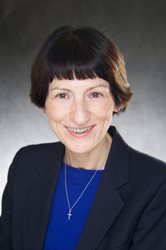 President-Elect candidate
President-Elect candidate
Mary E. Wilson, MD
University of Iowa, U.S.
Personal Statement
In a changing world with increasing emphasis on individualized achievement, gain, entertainment and education, the ASTMH stands out as an organization that prioritizes respect for all individuals and working toward a common good. The focus of the society on improving global health provides a theme of compassion that permeates the various priorities of the society. Maintaining a multifaceted approach to global health is key to our ability to make an impact. Factors contributing to the diseases we study are complex, and appropriately the priorities of the society include multiple goals: (1) disseminating knowledge of the devastating consequences that result from major health problems that are “hidden” from nations with ample resources, (2) helping to develop the scientific and medical task force to design and execute strategies to manage health issues, (3) bring global health priorities to the forefront of governmental and philanthropic organizations that can raise the necessary funds to deal with health issues, (4) support scientific discovery through both basic laboratory and epidemiologic research, and (5) translate research findings to practical measures to improve the public and personal health measures that will decrease the incidence of devastating infections and improve the health of populations with limited access to health care. The ASTMH has made great strides toward these goals. As we move forward in a time when monetary resources are more limited than in the past, it is essential that we not only maintain, but expand our programs.
Priorities for the near future include:
- Expand our reach by expanding our membership and geographic boundaries, incorporating student, junior and senior scientists and medical professionals from across the globe into our society;
- Support excellence in all aspects of scientific research, and encourage scientific partnerships between scientists and health care professionals throughout the world;
- Continue the existing, and seek expanded opportunities to support career development through grants and fellowship programs;
- Form partnerships with non-governmental organizations that can bring health priorities before Congress and governmental agencies;
- Encourage innovation in the approach to delivery of public or individual health care measures to impoverished populations.
These diverse efforts are unified by a common priority on improving global health. The diversity of the society provides strength, allowing us to tackle issues related to global health from a comprehensive perspective, and focus efforts on approaches with the greatest impact. Thus the coordinated efforts of all aspects of the society are needed to address the complex tasks involved in improving the major health issues that overwhelm populations residing in resource-poor countries.
Summary of Volunteer/Member Roles in ASTMH
- Member since Infectious Diseases fellowship
- Councilor (1992-1996)
- Young Investigator Committee (1993-1998)
- Scientific Program Committee (1995-2004)
- Nominating Committee (1997-1999)
- ASTMH Burroughs Wellcome Fellowship Selection Committee (2011-present)
- Section Editor, American Journal of Tropical Medicine and Hygiene (2012-present)
- Bailey K. Ashford Medal recipient (2005)
- Nominator for Honorary International Fellow (FASTMH) Members Jeronimo and Carvalho
- Symposium organizer
Biographical Information
Mary E. Wilson, MD is a Professor in the Departments of Internal Medicine and Microbiology at the University of Iowa, with appointments in the Department of Epidemiology and Interdisciplinary PhD programs in Genetics, Immunology and Molecular & Cellular Biology. She obtained her undergraduate degree at Carleton College in Minnesota and MD at the University of Rochester in New York. She did a residency in Internal Medicine at the University of Michigan and Infectious Diseases fellowship at the University of Virginia, with laboratory training guided by Richard Pearson, MD. Dr. Wilson is the PI of a long-standing T32 training program “Mechanisms of Parasitism” at the University of Iowa, and conducts collaborative research studies with colleagues in northeast Brazil and India. She has orchestrated multiple international research and clinical exchanges between the University of Iowa and programs in Brazil and India.
Research program
Studies in the Wilson lab focus on determinants of the host immune response that lead to the development of either asymptomatic infection with the Leishmania spp. protozoa, or to progressive, symptomatic manifestations of leishmaniasis. These range from the components sand fly saliva that are deposited in skin with the parasite, effects of the microbiomes of the sand fly and human skin, parasite-derived exosomes that release parasite contents into host cells, tissues and blood, and local antimicrobial responses of cells in human skin. Studies have revealed potent effects of skin-resident and infiltrating hematopoietic cells mobilized during the first hours to days of infection on the long-term immune response to these chronic infections. Collaborative studies with colleagues in India and Brazil allow us to investigate questions in both naturally infected humans and in animal models of leishmaniasis.
Professional activities
Prior membership in the NIH Microbiology and Infectious Diseases
Prior member and chair of the Infectious Diseases and Microbiology VA Merit Review Study Section
Current member of the Immunity and Host Defense Study Section (ongoing)
Panels and special review committees:
NIH workshop: Planning and Implementing Clinical Trials of Vaccines for Parasitic Diseases, 1995
Visceral leishmaniasis Workshop Panelist, Bill & Melinda Gates Foundation, 2014
NIH Workshop invited participant: Visceral Leishmaniasis Control and Elimination, Sept. 9-10, 2015
NIH Scientific Review Committee, Proteomics centers
Organizing Committee, Fourth, Fifth and Sixth World Congresses on Leishmaniasis (WorldLeish)